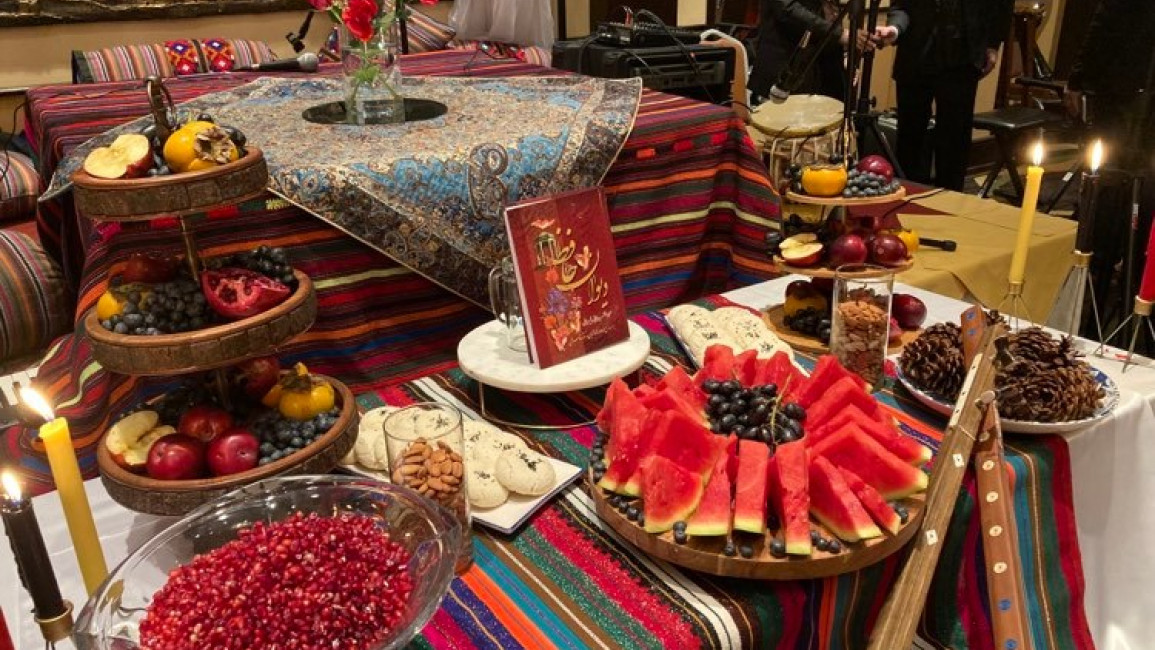Shab-e-Yalda: Afghans in Washington celebrate light over darkness on longest night of the year
At the time of the year when the days are at their shortest, Afghans and others from neighbouring countries are celebrating light over darkness.
Shab-e-Yalda, observed every year on the winter solstice (at and around 21 December), brings together extended families, friends, and communities for a night of food, poetry, songs, and stories. The ancient Zoroastrian holiday means the night of the forty, signifying the first forty days of winter, often the toughest period of the season that requires resilience and courage.
University of Virginia student Zainora Babayee came to the US with her family about five years ago, has fond memories of markets in Kabul displaying seasonal fruit in preparation for the holiday, and long nights of family gatherings, where they would read poems by legendary poets Mawlani Balkhi Rumi and Hafiz Shirazi. These days, she says, the holiday means even more to her.
"Being a diaspora here, it's different," she told The New Arab. "Yalda makes more sense now than before. Right now, Afghanistan is fighting against Taliban terrorists, and this gives us meaning that we should keep on fighting those who are trying to kill us and eliminate our culture.
"It's a fight against darkness. We're trying to rebel by keeping this tradition alive. It gives me energy and hope. We've lost the country, but we haven't lost the culture. We can keep the tradition alive until we get it back."
For Afghans in the Washington DC area, this year's Shab-e-Yalda celebration is special, coming less than six months after the US military withdrawal and at a time when many Afghans continue to stay on US military bases around the world to get their paperwork processed as they get ready for new lives in the US.
One such large celebration was on Monday night at Bamian, an Afghan restaurant in Falls Church, northern Virginia that hosted around 200 Afghans. For one night, the restaurant turned into a banquet hall where meticulous work was put into making the holiday as grand as it might be in Afghanistan.
"This is what a typical event would look like in Afghanistan. We tried our best to create a little Kabul," Angeza Zafar, an employment specialist who came to the US nearly five years ago and organiser of Monday's event, told The New Arab.
It was at a demonstration in August in front of the White House during the US evacuation of Afghanistan that she made friends with several other Afghans who came together to create a group they named the Kabul Washington Hub, a network where they can connect with the community about politics, society and culture. Shab-e-Yalda was their first organised event.
Decorating the stage were colourful tapestries, candles, string instruments, a book of poetry, and pomegranates and watermelons - deep red fruits signifying the resilience of the harvest season.
For Zahra Wakilzada, an international politics and women's and gender studies student at Georgetown University, who arrived in the US six years ago, this is her first time celebrating Shab-e-Yalda with the community.
"For us who have been here for a while, this is slowly becoming home," she told The New Arab. "In the past, parents were too busy working or feeding their families. Six years is about the time that people become established, and they can come out and skip a night of work. This brings us joy."
As the festivities continued into the early hours of the morning, Zafar looked around at the event she had helped organise. It was hours of nonstop poetry, speeches, and professional-level music, along with traditional food for the hundreds who had gathered - established members of the community and new arrivals from the summer's evacuation.
"There are a lot of stories here. Unfortunately, they're sad stories," she said. "The Afghan diaspora is finding comfort in each other's pain. This group is a product of resilience. We’re still seeking the sunrise."
After the planned performances wound up, and as the night turned into the early morning, members of the audience volunteered to take to the stage to sing acapella. One man with a clear baritone voice sang a song that carried through the large and crowded banquet hall. It was a familiar tune that was picked up by the audience, who continued the song to the end.
"It's a national song," said Zafar. "The flowers are going to bloom again in Afghanistan."



